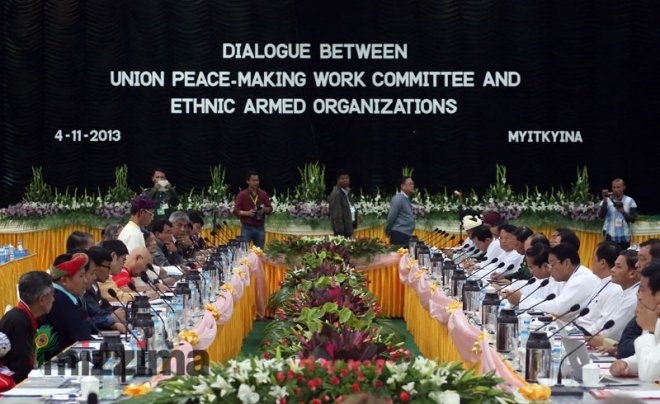Leaders of ethnic armed groups are scheduling a conference where discussions of a Federal Union Army, or a coalition comprised solely of members of ethnic groups, will be high on the agenda.

The conference will be held in late November or early December in Hpa-An, Kayin State, Colonel Saw San Aung, Tactical OperationsCommander of the Kalo Htoobaw Unit, told Mizzima.
“For many years, ethnic people have sacrificed their lives fighting for the right to have a Federal Union Army,” he said. “Now, as a nationwide ceasefire is looming, we are no closer to forming one. So we are gathering to figure out what to do.”
The main organizer of the conference is Colonel Aung’s Kalo Htoobaw Unit, afaction of the Democratic Karen Buddhist Army.
This will be the second conference in recent months between leaders of ethnic armed groups, following the Lazia summit meetings that concluded in late October. During the Lazia conference, armed group leaders decided that they would sign a nationwide ceasefire if the government guaranteed them political dialogues. No further agreements have been reached since then.
A Federal UnionArmy would be comprised of various ethnic armies including the Bamar (Burmese) army, the Karen army, and the Kachin army; however, the government has not yet given ethnic groups its permission to form one.
“The government has said that the assembly of a Federal Union Army is impossible,” said Colonel Aung. “We, the ethnic people, cannot trust any reasoning that the government is pulling from the 2008 constitution because its laws are not rooted in the needs of ethnic people.”
“[Ethnic people] need our autonomy,” said Captain Kyaw Thet, an officer of the Kalo Htoobaw Unit. “We have given up our lives to maintain our conviction that Karen weapons must stay in the hands of Karen people. Allethnic groups have similar convictions, and we cannot for sake them.”
Ethnic leaders also insist that demands for a Federal Union Army do not equate to demands for political or ideological secession.
Aung Naing Oo, a representative from the Myanmar Peace Center who has been supervising peacemaking activities acrossthe country, told Mizzima, “We need to be practical in resolving all varieties of conflicts. All involved parties need to take part in the conflict resolution process. We need to think, negotiate, and do what is right based on the reality of long-standing problems.”



